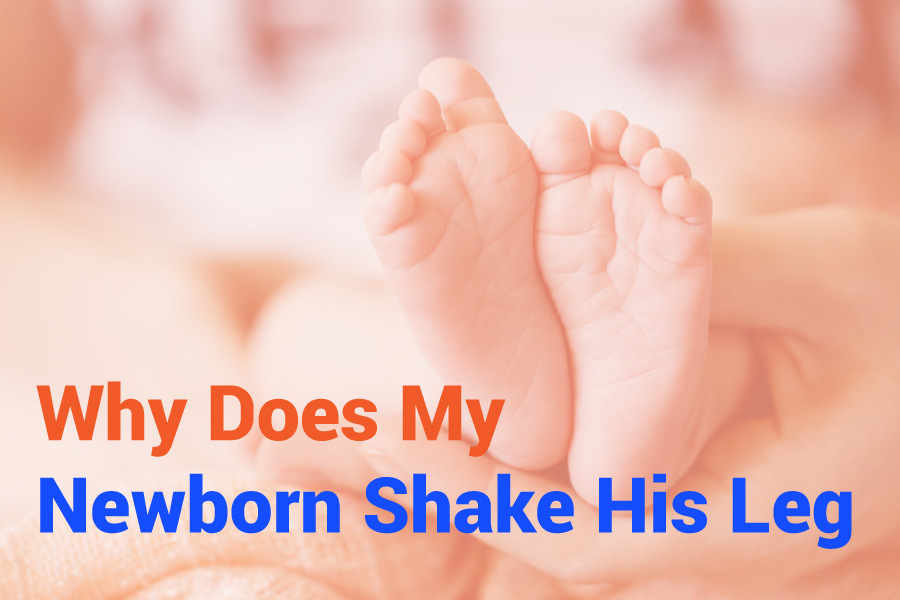New parents often observe a myriad of behaviors in their newborns, each sparking curiosity and sometimes concern. One such behavior is leg shaking. If you’ve noticed your newborn shaking his leg, you might be wondering why this happens and if it’s something to worry about. Understanding newborn behavior can be challenging, as infants cannot communicate their needs or discomforts verbally. This article will delve into the reasons behind leg shaking in newborns, exploring both benign causes and situations that might require medical attention. We’ll discuss normal developmental stages, common reflexes, and potential medical conditions that could cause this behavior. By the end, you’ll have a clearer understanding of when leg shaking is a typical part of your baby’s development and when it might be a sign of something more serious.
Why Does My Newborn Shake His Leg?
It’s common for parents to notice their newborn shaking his leg, and often, this is a normal behavior. Newborns have immature nervous systems, and their motor skills are still developing, which can lead to involuntary movements such as leg shaking. Common causes include reflexes like the Moro reflex, muscle twitches, or simply excitement. However, if the shaking is frequent, intense, or accompanied by other symptoms, it’s advisable to consult a pediatrician to rule out any underlying conditions.
Understanding Newborn Leg Shaking
Newborns often exhibit a variety of involuntary movements, including leg shaking, due to their immature nervous systems. These movements are usually harmless and part of normal development. One common cause is the Moro reflex, a startle response that can lead to jerky movements. This reflex usually fades by the time the baby is 3 to 4 months old. Muscle twitches, known as benign neonatal sleep myoclonus, are another reason. These twitches occur during sleep and are completely normal.
Sometimes, leg shaking can be attributed to your baby’s excitement or overstimulation. Newborns experience the world in a heightened state, and their responses can be more vigorous than those of older children. It’s essential to provide a calm environment to help soothe your baby and reduce overstimulation. Gentle rocking, swaddling, and soft music can create a serene atmosphere conducive to relaxation.
Another factor to consider is the development of motor skills. As babies grow, they practice moving their limbs, which can result in seemingly random leg movements. This exploration is a critical part of their growth and helps strengthen their muscles. Parents can encourage this by providing safe spaces for the baby to move and play.
In rare cases, persistent leg shaking might indicate an underlying medical condition such as a neurological disorder or metabolic issue. If the shaking is severe, frequent, or accompanied by other symptoms like poor feeding, irritability, or developmental delays, it’s crucial to seek medical advice. Early intervention can make a significant difference in addressing any potential health concerns.
Observing and understanding your newborn’s behavior is a learning process. Most of the time, leg shaking is just a phase that will pass as your baby’s nervous system matures. Being patient and providing a supportive environment can help your baby navigate these early stages of development comfortably.
Possible Medical Concerns
1. Neurological Disorders
Leg shaking in newborns could sometimes indicate neurological disorders. Conditions like epilepsy or cerebral palsy can cause involuntary movements. If you notice your baby’s leg shaking is accompanied by other signs such as seizures, muscle stiffness, or lack of coordination, consult a pediatric neurologist.
2. Metabolic Issues
Certain metabolic disorders might also present with symptoms like leg shaking. These conditions affect how the body processes nutrients and can lead to muscle spasms or tremors. Blood tests and other diagnostic tools can help identify these issues early.
3. Withdrawal Symptoms
Babies born to mothers who used certain medications or substances during pregnancy might exhibit withdrawal symptoms, including leg shaking. This is known as Neonatal Abstinence Syndrome (NAS). Symptoms can include irritability, poor feeding, and tremors. Medical supervision is essential to manage NAS effectively.
4. Genetic Disorders
Some genetic conditions can manifest as involuntary movements in newborns. For instance, disorders affecting the muscles or nervous system might lead to leg shaking. Genetic testing and counseling can provide clarity and guide appropriate interventions.
5. Infections
Infections affecting the brain or nervous system, such as meningitis or encephalitis, can cause leg shaking. These conditions are typically severe and require immediate medical attention. Watch for other signs like fever, irritability, and feeding difficulties.
Normal Vs. Concerning Leg Shaking
Newborn leg shaking can be normal or a sign of concern. Understanding the difference is crucial.
1. Normal Shaking:
- Part of Moro reflex.
- Benign sleep myoclonus.
- Response to excitement or overstimulation.
- Motor skill development.
2. Concerning Shaking:
- Persistent and intense.
- Accompanied by other symptoms.
- Possible indicator of neurological or metabolic issues.
- Requires medical evaluation.
- Regular pediatric check-ups can help monitor your baby’s development and address any concerns early on. Trust your instincts as a parent and seek professional advice if something feels off.
Alternative Perspectives On Newborn Movements
Some experts suggest that involuntary movements in newborns, including leg shaking, might have evolutionary roots. These movements could be remnants of primitive reflexes crucial for survival. For instance, the Moro reflex might have helped infants cling to their mothers in response to sudden movements. While these reflexes fade with time, they highlight the complexity of human development.
Another perspective is the role of sensory development. Newborns are constantly adjusting to sensory stimuli in their environment. Leg shaking could be a response to new sensations, helping babies process and adapt to their surroundings. This view emphasizes the importance of providing diverse sensory experiences to support neurological growth.
Additionally, some researchers focus on the connection between early motor activity and cognitive development. Movements like leg shaking might play a role in building neural pathways that support future learning and motor skills. Encouraging safe, exploratory play can foster both physical and cognitive growth in newborns.
Managing Newborn Leg Shaking
- Creating a Calm Environment: A serene environment helps reduce overstimulation. Soft lighting, gentle music, and minimal background noise can soothe your baby.
- Monitoring and Observation: Regularly monitor your baby’s movements. Note any patterns or changes in the frequency and intensity of leg shaking. Keep a journal to share with your pediatrician.
- Pediatric Consultation: Consult your pediatrician if you have concerns. They can conduct thorough evaluations and recommend further tests if necessary.
- Parental Support and Resources: Seek support from other parents or parenting groups. Sharing experiences and advice can be reassuring. Utilize resources like books, websites, and hotlines for additional guidance.
- Encouraging Motor Development: Provide safe spaces for your baby to move and explore. Gentle exercises, tummy time, and age-appropriate toys can support motor skill development.
Conclusion
Most newborn leg shaking is harmless and part of normal development. However, if you notice persistent, intense shaking or accompanying symptoms, consult your pediatrician. Understanding the causes and being proactive about your baby’s health can ensure their well-being and development.
FAQ’s
Why Does My Newborn Shake His Leg In Sleep?
Newborns often shake their legs in sleep due to benign neonatal sleep myoclonus, which is normal and usually not a cause for concern.
Is Leg Shaking In Newborns A Sign Of A Neurological Problem?
While most leg shaking is harmless, persistent or severe shaking could indicate a neurological issue. Consult a pediatrician for an accurate diagnosis
How Can I Tell If My Baby’s Leg Shaking Is Normal?
Normal leg shaking is usually brief and not accompanied by other symptoms. If the shaking is intense or persistent, seek medical advice.
Can Overstimulation Cause Leg Shaking In Newborns?
Yes, overstimulation can lead to leg shaking. Creating a calm environment can help reduce these occurrences.
When Should I Consult A Doctor About My Newborn’s Leg Shaking?
If the shaking is frequent, intense, or accompanied by other symptoms like poor feeding or irritability, consult your pediatrician for a thorough evaluation.









